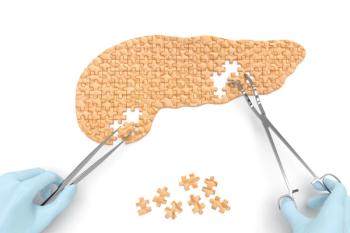
Increased Risk for Lung Cancer May Be Linked With Metabolic Syndrome
Study results suggest an association between lung cancer, low high-density lipoprotein cholesterol, waist circumference, and glycated hemoglobin.
An increased risk for lung cancer may be associated with metabolic syndrome; therefore, taking metabolic status and markers into account may be important when treating this patient population, according to study results published in Chest.1
Although both the incidence of lung cancer and the prevalence of metabolic syndromes, including hypertension, dyslipidemia, central obesity, and insulin resistance, are increasing, the association between them is still debated. Previous studies assessed these association but had smaller sample sizes and, therefore, lacked power to support their hypotheses.
To further investigate this association, a team of international researchers conducted a population-based prospective cohort study that aimed to assess the association between metabolic syndrome, the number of metabolic abnormalities, metabolic syndrome components, and metabolic markers with risk of lung cancer. The investigators also aimed to determine the effect modifications by sex, smoking status, and use of medication.
A total of 331877 participants were included in the study (mean age, 56.3 years; 53% women). Of the cohort, 77173 individuals had metabolic syndrome at time of enrollment (prevalence, 23.3%). Compared with those without metabolic syndrome, participants with metabolic syndrome were more likely to be older and have a lower socioeconomic status. Participants with metabolic syndrome were also more likely to be men, non-White, smokers, exposed to second-hand smoking, have a family history of lung cancer, have chronic obstructive pulmonary disease, and have obesity. Additionally, 82.6% of participants had at least 1 metabolic disorder: the most common was hypertension and the least common was hyperglycemia.
Following 3,462,163 person-years of follow-up, a total of 2425 individuals developed cancer with the lungs as the primary site. Incidence rates for those with metabolic syndrome and without metabolic syndrome were 97.7 and 61.8 per 100,000, respectively, but increased with increasing number of metabolic abnormalities. Lung cancers included adenocarcinoma (n=1001), squamous cell carcinoma (n=503), large cell carcinoma (n=26), and small cell carcinoma (n=246).
Following adjustments for covariates, there was a significant association between metabolic syndrome and risk for lung cancer (hazard ratio [HR], 1.21). Low high-density lipoprotein cholesterol (HDL-C; HR, 1.20), increase in waist circumference (HR, 1.36), and hyperglycemia (HR, 1.30) were all associated with lung cancer. Additionally, incidence rates were higher for those with metabolic syndrome and adenocarcinoma (HR, 1.28) and squamous cell carcinoma (HR, 1.16).
After modifying by sex, the relationship between metabolic syndrome and risk for lung cancer was found to be greater in women than men (HR, 1.38; P = .031). Compared with men, the risk for lung cancer among those with 5 metabolic abnormalities was higher in women, especially for those with hypertriglyceridemia (HR, 1.18; P =.014). Although the modification effect for smoking was not observed for variables related to metabolic syndrome, the risk of lung cancer due to metabolic syndrome was higher in smokers compared to nonsmokers (HR, 1.32 and 1.11, respectively). Additionally, following adjustment, HR curves yielded significant, nonlinear associations between lung cancer and HDL-C levels, waist circumference, and glycated hemoglobin (HbA1c). With increasing levels of HDL-C, the risk for lung cancer decreased, while the risk increased with waist circumference after controlling for body mass index.
“With the rapid increase in the prevalence of [metabolic syndrome] worldwide, it is important to have a better understanding of its impact on lung cancer,” the researchers noted. “Although a causal association between [metabolic syndrome] and lung cancer cannot be verified through this study, the evidence obtained suggests the importance of taking metabolic status and markers into the selection of high-risk populations for lung cancer screening, and highlights a new direction of lung cancer prevention.”
Reference
1. Li M, Cao SM, Dimou N, Wu L, Li JB, Yang J. Association of metabolic syndrome with risk of lung cancer: a population-based prospective cohort study. Chest. Published online August 10, 2023. doi:10.1016/j.chest.2023.08.003
Newsletter
Pharmacy practice is always changing. Stay ahead of the curve with the Drug Topics newsletter and get the latest drug information, industry trends, and patient care tips.























